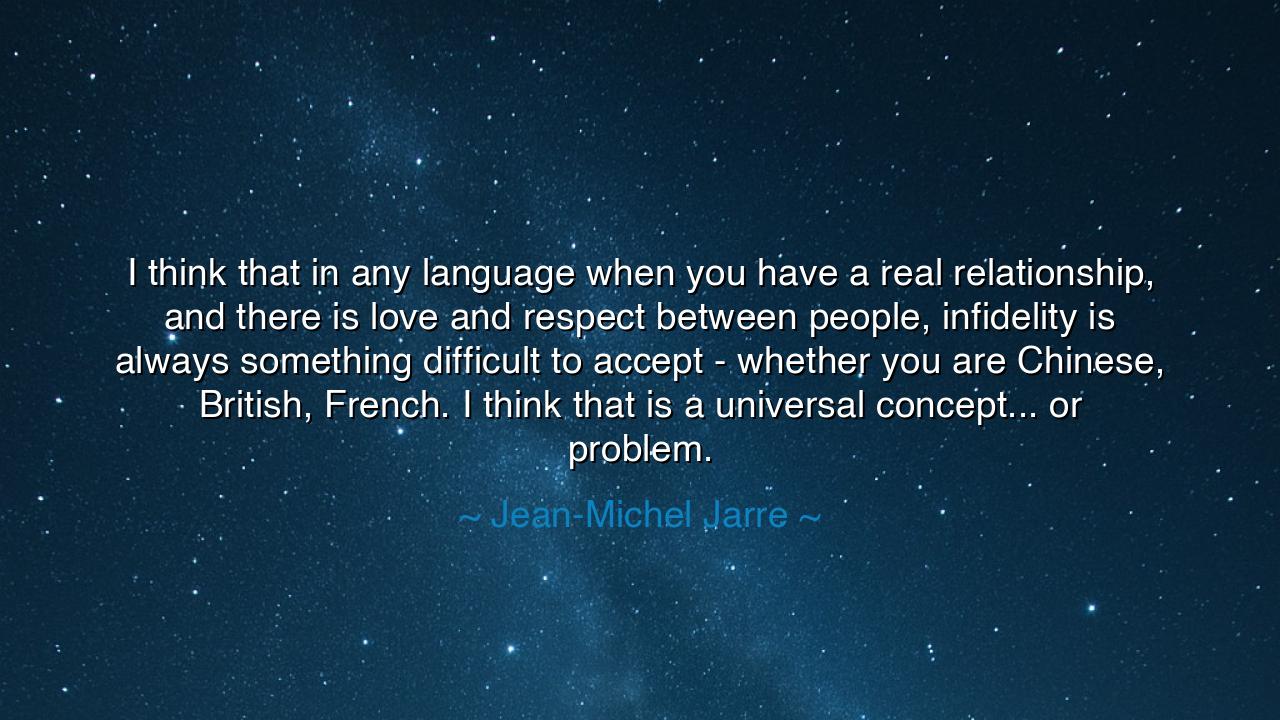
I think that in any language when you have a real relationship
I think that in any language when you have a real relationship, and there is love and respect between people, infidelity is always something difficult to accept - whether you are Chinese, British, French. I think that is a universal concept... or problem.






When Jean-Michel Jarre reflected, “I think that in any language when you have a real relationship, and there is love and respect between people, infidelity is always something difficult to accept—whether you are Chinese, British, French. I think that is a universal concept... or problem,” he touched upon one of the deepest wounds of the human heart. His words are not limited to culture or nation; they pierce to the essence of human trust. For in all lands, across all centuries, betrayal of love has been a grief no tongue can soften and no tradition can justify.
He begins with the pillars of any real relationship: love and respect. These are the twin roots that nourish the tree of intimacy. Love without respect falters, for affection cannot survive contempt; respect without love withers, for honor without warmth is cold. Together, they create the sacred bond between souls. And yet, it is precisely this sacred bond that infidelity shatters. Jarre names it not as a cultural quirk, but as a universal problem, for wherever human hearts bind themselves to one another, betrayal of that bond is felt as a wound.
The ancients understood this pain. Consider the tale of Helen of Troy, whose departure with Paris brought ruin upon nations. To the Greeks, her act was not merely the cause of war, but the very symbol of infidelity’s destructive power. What began as the breach of trust between man and wife spilled into ten years of bloodshed. This myth, preserved through millennia, shows that the anguish of betrayal has always been more than personal; it tears at the very fabric of communities. Jarre’s words remind us that whether in Greece or China, in France or Britain, the breaking of fidelity has always carried the same weight of sorrow.
Why is infidelity so universally painful? Because it violates the deepest human need: the need to be safe in love. Money may be lost, status may change, health may falter—but to be betrayed in love is to have the very ground beneath one’s feet collapse. It is a theft not of possessions, but of trust, of dignity, of the belief that one is cherished above all others. This is why no culture, however tolerant of other faults, has ever found it easy to forgive betrayal of the heart.
Yet Jarre also names it as a concept... or problem, acknowledging that while infidelity is universally condemned, it is also universally present. Across every border, across every century, human weakness and desire clash with loyalty and trust. This tension is part of the frailty of humankind. And so his words carry both recognition of our shared pain and a warning that this problem is not confined to “others,” but belongs to us all.
For us, the lesson is clear: guard love and respect as sacred treasures. Do not treat fidelity as a mere expectation, but as a vow that honors the humanity of the one you love. The heart is not a possession to be traded, but a sanctuary to be protected. When tempted by distraction, remember that betrayal wounds not only another but also yourself, for it corrodes your own honor.
Practical wisdom follows: cultivate openness in relationships; speak before silence hardens into distance. Nurture respect daily, in small acts of kindness and in restraint of harsh words. Honor commitments not only in deed but in thought, for loyalty begins in the heart. And if betrayal has scarred you, let healing teach you wisdom, not bitterness. For though infidelity is a universal problem, so too is the resilience of the human spirit, which can learn, forgive, and begin anew.
Thus, Jarre’s words stand as both lament and guidance. Infidelity may be as old as humanity, but so too are love, respect, and the pursuit of faithfulness. Let us choose, in our time, to live by the higher law of loyalty, so that our relationships may be not sources of sorrow, but sanctuaries of strength, across every language, every nation, every age.






AAdministratorAdministrator
Welcome, honored guests. Please leave a comment, we will respond soon